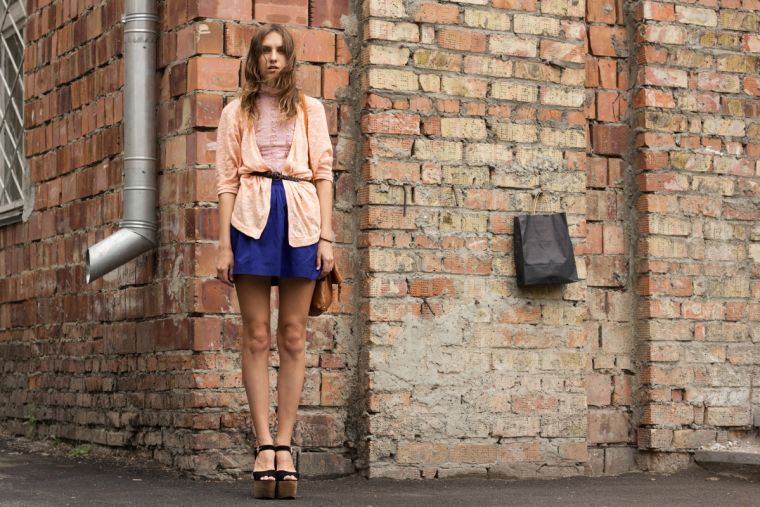Does God care what I wear?
Not more pressure, please. I already feel judged enough about how I look, whether I am wearing the right clothes or not for this season, and what that says about me.
But yes, I have to admit it: God cares very much about the clothes I wear, not because of how they make me look but because they represent both a moral and a spiritual choice.
Syrian child refugees have been found making clothes for major fashion labels such as Mango, Zara, ASOS and even our beloved Marks and Spencers. And I'm not even shocked. Depressing, isn't it?
Since the tragic collapse of the Rana Plaza factory in Dhaka, Bangladesh over three years ago, I've become increasingly concerned about how and where my clothes are made. Once I started unpicking the layers, or perhaps more appropriately threads, of the garments I wore so casually, I didn't have to look far to see just how exploitative and damaging the fashion industry is.
 Belovodchenko Anton
Belovodchenko Anton
Advertisement
Not only is fashion the world's second largest polluter after the oil industry but it is built on the premise of millions of underpaid garment workers working in unsafe conditions for dangerously long hours to meet the insatiable demand of customers' fashion expectations.
As Livia Firth so articulately states in the excellent film The True Cost, which exposes the horror of the fashion industry: 'The actual business model is completely unsustainable'. If you haven't seen the film and you wear clothes, I urge to watch it.
It won't be news to many of you. If the Rana Plaza disaster didn't slow down sales at Primark, it certainly awoke in many of us a consciousness that the fashion industry is about as destructive as you can get.
The system is out of control. Fast fashion has created 52 seasons a year and consumerism breeds on the notion that we'll never be satisfied wearing last season's (ie last week's) clothes. The fashion industry is driven by our 21st century insecurities and paranoias about never looking right, feeling right, until we spend just a little bit more.
Sponsored
Watch Your Favorite Christian Films, 24/7.
Click Here To Start Your Free Trial Today
Which is why Panorama's discovery that children who fled the war in Syria are now being employed to make our clothes in Turkey doesn't surprise me. We need them, after all, to help us keep up with our ever-changing wardrobe.
I recently heard Dilys Williams, Director and Professor of Fashion Design for Sustainability speak at an event on ethical fashion, where she said: "We need to think of fashion as cultural, relational, social and environmental. Fashion is not a commodity. It's about relationship and connection."
When we become disconnected from how our clothes our made or where our food comes from or just what it takes to make our iPhones, we lose the humanity behind the products. We neglect to see that they have been on a journey before they reached our hands, involving the skills, time and effort of often hundreds of people; and that, in some form, they started and will end life in the very earth which God created.
I'm not so much concerned with blaming this shop or that shop for what they have or haven't done, although I would certainly advocate for petitioning your favourite stores to ensure they are doing all they can to keep their supply chains as clean as possible. I'm interested in where, as a society, we are getting our identity from, and questioning some of the root causes of this consumerist, as opposed to relational, approach to fashion.
By asking myself some simple questions, I have begun to free myself from the clutches of my own fashion addiction: What kind of person do I want to be? Where do I get my identity from? Why do I feel the need to own so many clothes? I've had to face my own issues and look consumerism in the eye in order to begin to turn away from it. And, in all honesty, I'm far from free. You'd only need to take a look at my exploding chest of drawers, which long ago ceased being able to hold all the many clothes I own, to see what I mean.
I would add to Dilys Williams' statement by saying that fashion is also spiritual. We cannot disconnect our faith from the everyday. The clothes we chose to wear are as much a statement of our faith as speaking out the creed. Do we believe all human life is sacred? Do we believe that God wants all people to flourish and live out their potential? Do we believe God calls us to protect the earth he created? If we agree with those statements, it will affect what we wear on our backs. We will no longer be able to disconnect from these issues as being irrelevant and overwhelming. It will force us to open our eyes to the injustices of the fashion industry and make different decisions.
Katherine Maxwell-Rose is a writer, speaker and activist campaigning on issues of social justice and transformation. She is part of a community of peacemakers from the charity CHIPS (Christian International Peace Service) living on estates in Brixton affected by gang violence.


